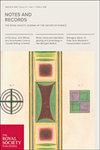Instrument provision and geographical science: the work of the Royal Geographical Society, 1830–ca 1930
IF 0.6
3区 哲学
Q3 HISTORY & PHILOSOPHY OF SCIENCE
Notes and Records-The Royal Society Journal of the History of Science
Pub Date : 2018-10-10
DOI:10.1098/RSNR.2018.0034
引用次数: 6
Abstract
This paper examines the Royal Geographical Society's provision and management of scientific instruments to explorers and expeditions in the century following its foundation in 1830. Assessment of the Society's directives concerning appropriate scientific instruments for the conduct of geography reveals the emergence (slow and uneven) of policies concerning the assignment of instruments. From examination of Council minutes and related manuscript sources, the paper documents the numbers of instruments acquired by the Society, by whom used, for what scientific purpose and in which parts of the world. The paper examines the number and chronology of expeditions supported by the Society's instruments, examines the expenditure upon instruments’ repair, and discusses the publications that followed their use in exploration. Correspondence between instrument users and the Society reveals that, on occasion, the use of instruments was adventitious. While geographical knowledge depended upon the use of scientific instruments to measure and to depict the world, geography was not a formally institutionalized survey science as was the case with the Geological Survey or the nation-defining mapping of Ordnance Survey.仪器供应和地理科学:英国皇家地理学会的工作,1830年至1930年
本文考察了英国皇家地理学会在1830年成立后的一个世纪里为探险家和探险队提供和管理科学仪器的情况。对学会关于开展地理活动的适当科学仪器的指示的评估表明,有关仪器分配的政策出现了(缓慢和不均衡)。通过对理事会会议记录和相关手稿来源的审查,该论文记录了学会获得的仪器数量,由谁使用,用于什么科学目的,以及在世界的哪些地区。本文考察了由学会仪器支持的探险次数和时间顺序,考察了仪器维修支出,并讨论了仪器在探险中使用后的出版物。仪器使用者和学会之间的通信表明,有时,仪器的使用是偶然的。虽然地理知识取决于使用科学仪器来测量和描绘世界,但地理并不是一门正式制度化的调查科学,就像地质调查局或国家定义的军械调查局测绘一样。
本文章由计算机程序翻译,如有差异,请以英文原文为准。
求助全文
约1分钟内获得全文
求助全文
来源期刊
CiteScore
1.50
自引率
0.00%
发文量
45
审稿时长
>12 weeks
期刊介绍:
Notes and Records is an international journal which publishes original research in the history of science, technology and medicine.
In addition to publishing peer-reviewed research articles in all areas of the history of science, technology and medicine, Notes and Records welcomes other forms of contribution including: research notes elucidating recent archival discoveries (in the collections of the Royal Society and elsewhere); news of research projects and online and other resources of interest to historians; essay reviews, on material relating primarily to the history of the Royal Society; and recollections or autobiographical accounts written by Fellows and others recording important moments in science from the recent past.

 求助内容:
求助内容: 应助结果提醒方式:
应助结果提醒方式:


